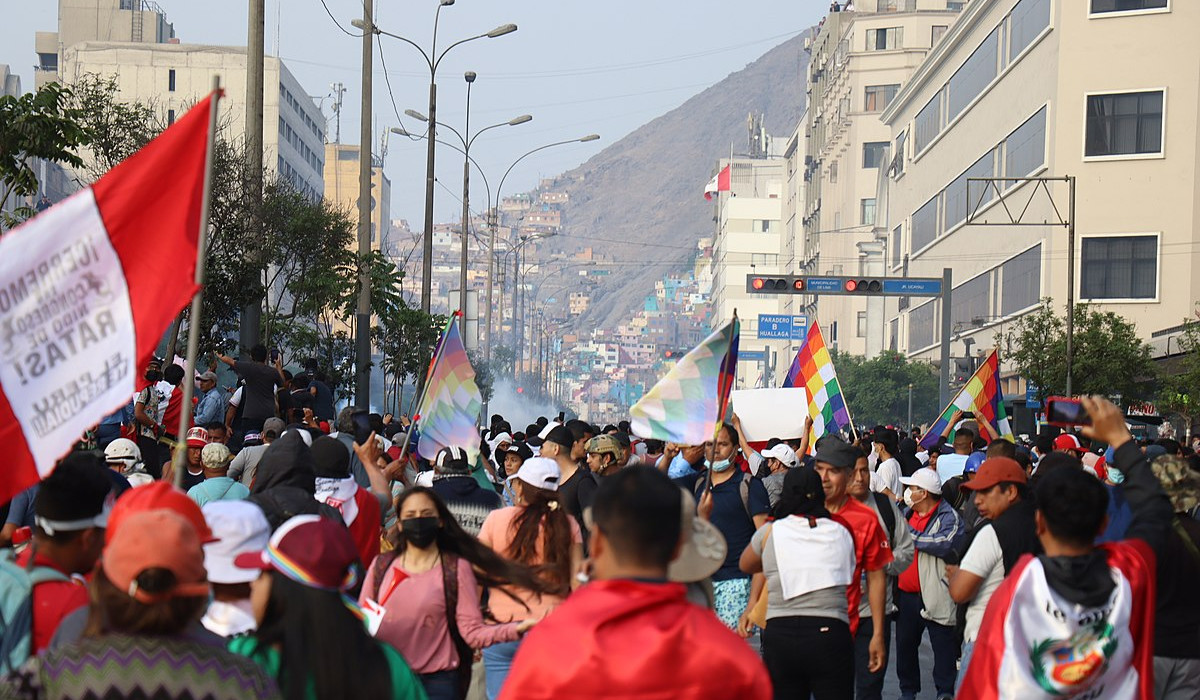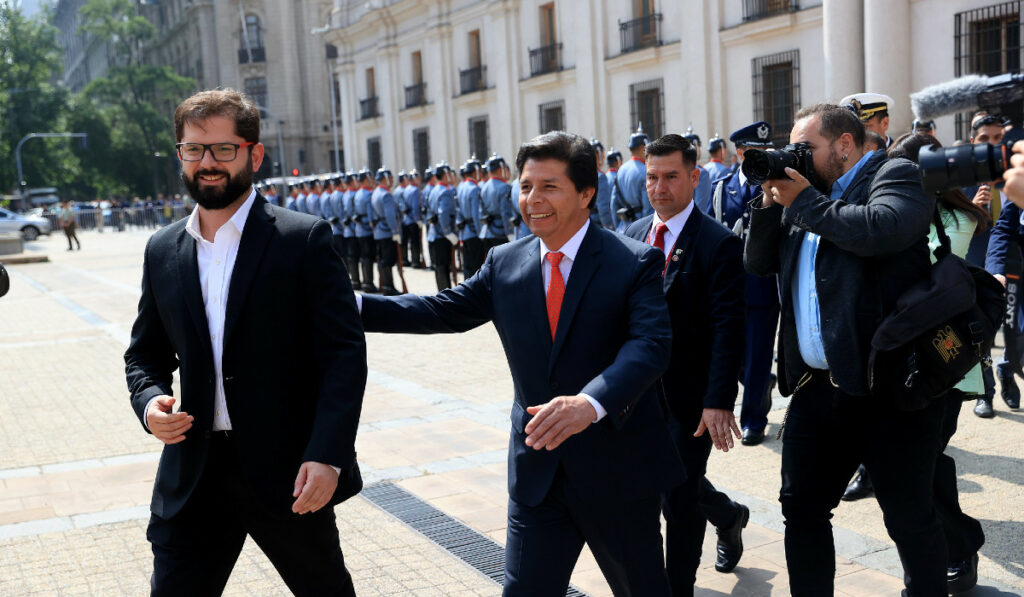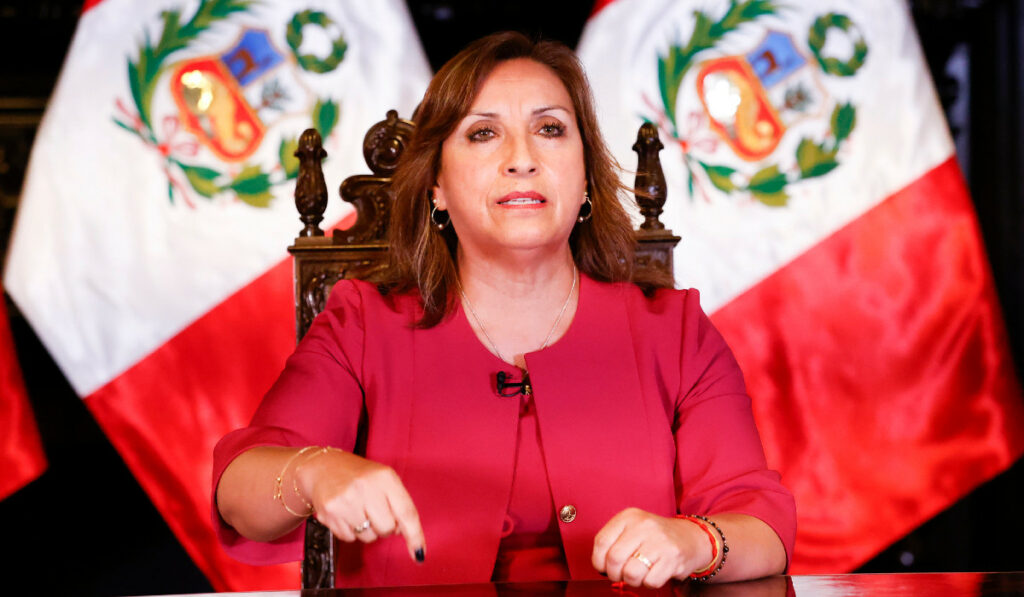 Protests in Lima December 2022. Photo: Mayimbú / Wikimedia Commons / CC BY-SA 4.0
Protests in Lima December 2022. Photo: Mayimbú / Wikimedia Commons / CC BY-SA 4.0
Protestors are demanding the resignation of President Dina Boluarte, after weeks of demonstrations opposing the coup that removed her predecessor, Pedro Castillo, reports Jonathan Maunders
As Boluarte desperately calls for a ‘national truce’ and tries to tie the protests to organised criminal gangs, Peruvians are demanding an end to the violent police repression of protestors and a fresh set of elections.
What’s happening?
On 7 December, Peruvian president Pedro Castillo delivered a seismic address to the nation. Castillo, elected in 2021 on a tide of opposition to neoliberalism, declared a national state of emergency and announced he was replacing congress with an ‘exceptional emergency government’. In doing so, Castillo stated that this was a temporary measure aimed at ‘re-establishing the rule of law and democracy’.
Some of Castillo’s ministers, including then Vice-President Boluarte, publicly opposed Castillo’s announcement. Meanwhile, Peru’s congress, dominated by the right, called an emergency meeting before voting to impeach him. They then quickly swore in Boluarte as Castillo’s successor. With Castillo remaining detained ever since, under investigation for alleged rebellion, Peruvians have continued to line the streets to demand his release and oppose what they see as a coup by a corrupt congress.
#LIMA | Policía reprime marcha contra Dina Boluarte. En Plaza Bolognesi, agentes impiden el paso de los ciudadanos, lanzan bombas lacrimógenas y disparan perdigones.#ParoNacionalPeru #EstallidoSocial#VocesComunitarias
📷@JuanZapata108 / Wayka pic.twitter.com/p3tj47rgO5
— 🇵🇪 Wayka📢 (@WaykaPeru) January 27, 2023
The response to these demonstrations has been brutal, with at least 56 protesters losing their lives. Boluarte tried to blame the deaths on other protesters, but this was quickly debunked by Peru’s ombudsman. This has only acted to increase the opposition to the new government, with protestors now chanting ‘Boluarte, murderer’ as they continue to demand immediate elections.
Chile’s leftist president, Gabriel Boric, has expressed his solidarity with those protesting, saying, ‘we can’t be indifferent today when in our sister nation Peru, people who go out to march and demand what they consider to be fair, end up shot by those who should defend them.’

How did we get here?
Many in Peru’s political establishment have naturally looked to portray Pedro Castillo’s 7 December announcement as an attempted undemocratic power-grab, but the truth is more complicated. Castillo had faced intense political opposition ever since he took office in July 2021. Peru’s congress is stacked with right-wing politicians who looked to block him and his policies at every turn. Even before he made the 7 December announcement, Castillo was facing his third impeachment attempt, this one on the grounds of ‘mental incapacity’.
While he would have likely survived this attempt, like those before, it was all part of a campaign to discredit and frustrate his presidency. This came as figures in congress and the media constantly levelled corruption allegations against Castillo, most of which have been debunked.
While the decision to dissolve parliament is a radical and potentially dangerous one, some have suggested that it was seen as Castillo’s only way to bring about the policies upon which he was elected. Indeed, while his popularity figures took a hit in office, they were still higher than that of congress. Either way, Peru is now in a state of mass public anger.

What now?
The protests don’t seem to be stopping anytime soon, but it looks like they may soon achieve their first victory. It is now being reported that moves are under way to impeach Dina Boluarte, ironically by the same members of congress who gave her the job.
They surely hope this will quell the public anger, but it is unlikely to work. While those lining the streets are desperate for Boluarte to resign, they see her presidency as the result of Peru’s corrupt congress. Removing her will not cure that.
Peruvians delivered a seismic shock to the political establishment in 2021, electing Pedro Castillo on a wave of opposition to decades of disastrous neoliberal policies and corruption. They must now continue taking to the streets to demand fresh and fair elections and ensure that victory was not in vain.
Join Revolution! May Day weekender in London
The world is changing fast. From tariffs and trade wars to the continuing genocide in Gaza to Starmer’s austerity 2.0.
Revolution! on Saturday 3 – Sunday 4 May brings together leading activists and authors to discuss the key questions of the moment and chart a strategy for the left.

